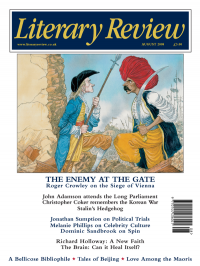David Jays
Liquid Lives
Dreams of Rivers and Seas
By Tim Parks
Harvill Secker 435pp £16.99
Tim Parks’s latest novel is too, too much. Its characters are adrift, even when they appear most purposeful. Their attempts to read the world are continually muddled, their relationships stumbling and blurred. And the Western principal characters are in Delhi, a city which continually offers a sprawling sensory overload.
Everything takes its tone from the central, if deceased, character, a quixotic anthropologist apparently defeated by his attempts to find patterns in human experience. Albert James has died suddenly in New Delhi. His son, John, flies over from London for the funeral and to join his mother, Helen. She seems distant, the tributes to his father throw up as many questions as answers, and a prospective American biographer buzzes around Helen.
India itself is presented as a country overwhelming the characters with sensation. It’s teeming with noise and smell, klaxons and yellow petals, and Delhi is a city that constantly blurs at the borders. It might be on the edge of liquefaction: ‘The evening simmered with abrupt cries and bright lights

Sign Up to our newsletter
Receive free articles, highlights from the archive, news, details of prizes, and much more.@Lit_Review
Follow Literary Review on Twitter
Twitter Feed
The era of dollar dominance might be coming to an end. But if not the dollar, which currency will be the backbone of the global economic system?
@HowardJDavies weighs up the alternatives.
Howard Davies - Greenbacks Down, First Editions Up
Howard Davies: Greenbacks Down, First Editions Up - Our Dollar, Your Problem: An Insider’s View of Seven Turbulent...
literaryreview.co.uk
Johannes Gutenberg cut corners at every turn when putting together his bible. How, then, did his creation achieve such renown?
@JosephHone_ investigates.
Joseph Hone - Start the Presses!
Joseph Hone: Start the Presses! - Johannes Gutenberg: A Biography in Books by Eric Marshall White
literaryreview.co.uk
Convinced of her own brilliance, Gertrude Stein wished to be ‘as popular as Gilbert and Sullivan’ and laboured tirelessly to ensure that her celebrity would outlive her.
@sophieolive examines the real Stein.
Sophie Oliver - The Once & Future Genius
Sophie Oliver: The Once & Future Genius - Gertrude Stein: An Afterlife by Francesca Wade
literaryreview.co.uk